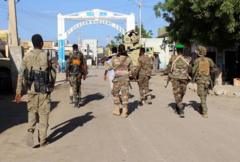The hopes of resolving nuclear tensions hinge on indirect talks set to take place in Oman with strict terms laid out by Iran.
Iran Stresses Readiness for Nuclear Negotiations, Demands End to Military Threats

Iran Stresses Readiness for Nuclear Negotiations, Demands End to Military Threats
Iran's Foreign Minister signals willingness to negotiate with the US, provided military options are off the table.
The Iranian government has announced its readiness to engage in negotiations regarding its nuclear program, contingent upon the US ceasing its military threats. Foreign Minister Abbas Araghchi made this statement as the two nations prepare for talks on Saturday in Oman, marking a potential turning point in discussions that have been fraught with tension.
During his remarks, Araghchi emphasized that Iran would engage "with a view to seal a deal," but warned that any coercion from the US would not be tolerated. Notably, he clarified that the talks would be indirect, contrary to US President Donald Trump’s declaration that they would be direct.
In a climate of heightened concern, Trump, who withdrew the US from the 2015 nuclear agreement during his first term, conveyed that failure in these negotiations could lead Iran into a perilous situation. He has previously communicated his desire for Iran to back away from developing nuclear weapons via an unconventional message: a letter to Iran's Supreme Leader sent through the United Arab Emirates.
The backdrop of these negotiations includes an ongoing lack of diplomatic relations between the two countries. US leaders, including Trump and Israeli Prime Minister Benjamin Netanyahu, have set the stakes high, with Netanyahu insisting that "Iran will not have nuclear weapons."
Iran has consistently maintained that its nuclear ambitions are purely peaceful, yet the country has gradually exceeded the limits established by the previous nuclear agreement, which was intended to curb its nuclear development in exchange for the alleviation of sanctions.
As talks approach, both sides are gearing up for what could be decisive discussions. The US plans to demand comprehensive dismantlement of Iran’s nuclear capabilities, which has already prompted a strong rejection from Iranian officials who have stated they will not entertain a "Libya-style" disarmament deal.
Despite the potential for a diplomatic breakthrough, skepticism lingers regarding whether these negotiations will yield meaningful progress. As Araghchi noted, Iran has “serious doubts” about the authenticity of the US's intentions in the face of what it perceives as a persistent campaign of pressure through sanctions.
As the weekend's meeting looms, both nations appear to acknowledge the significant implications of the talks, with Araghchi asserting, "The ball is now in America's court." The outcome of this diplomatic engagement may well shape the future of international relations in the region, as both countries navigate the tightrope of expectations and demands within the high-stakes landscape of nuclear policy.
During his remarks, Araghchi emphasized that Iran would engage "with a view to seal a deal," but warned that any coercion from the US would not be tolerated. Notably, he clarified that the talks would be indirect, contrary to US President Donald Trump’s declaration that they would be direct.
In a climate of heightened concern, Trump, who withdrew the US from the 2015 nuclear agreement during his first term, conveyed that failure in these negotiations could lead Iran into a perilous situation. He has previously communicated his desire for Iran to back away from developing nuclear weapons via an unconventional message: a letter to Iran's Supreme Leader sent through the United Arab Emirates.
The backdrop of these negotiations includes an ongoing lack of diplomatic relations between the two countries. US leaders, including Trump and Israeli Prime Minister Benjamin Netanyahu, have set the stakes high, with Netanyahu insisting that "Iran will not have nuclear weapons."
Iran has consistently maintained that its nuclear ambitions are purely peaceful, yet the country has gradually exceeded the limits established by the previous nuclear agreement, which was intended to curb its nuclear development in exchange for the alleviation of sanctions.
As talks approach, both sides are gearing up for what could be decisive discussions. The US plans to demand comprehensive dismantlement of Iran’s nuclear capabilities, which has already prompted a strong rejection from Iranian officials who have stated they will not entertain a "Libya-style" disarmament deal.
Despite the potential for a diplomatic breakthrough, skepticism lingers regarding whether these negotiations will yield meaningful progress. As Araghchi noted, Iran has “serious doubts” about the authenticity of the US's intentions in the face of what it perceives as a persistent campaign of pressure through sanctions.
As the weekend's meeting looms, both nations appear to acknowledge the significant implications of the talks, with Araghchi asserting, "The ball is now in America's court." The outcome of this diplomatic engagement may well shape the future of international relations in the region, as both countries navigate the tightrope of expectations and demands within the high-stakes landscape of nuclear policy.





















